 As you probably know, we’re big fans of the Internet-based telephony application Skype, and when we got our grubby hands on an imate JAM PocketPC phone (with SanDisk Wi-Fi card), we couldn’t wait to start reaping those free VoIP calls with Skype for Pocket PC, v1.1.0.6.
As you probably know, we’re big fans of the Internet-based telephony application Skype, and when we got our grubby hands on an imate JAM PocketPC phone (with SanDisk Wi-Fi card), we couldn’t wait to start reaping those free VoIP calls with Skype for Pocket PC, v1.1.0.6.
A quick visit to Skype’s website bagged the free 2.5 meg download, and told us that our machine was up to the job.
Skype recommends a rather beefy 400 MHz processor or above, so our JAM phone (also known as the T-Mobile MDA Compact) should be fine for the job with its sprightly 416 Mhz CPU.
Seeing as most PDA/smartphone users typically operate their devices in power saving modes running the processor significantly slower than top speed, there is a danger that Skype’s demanding CPU footprint may turn into something of a battery hog, so be warned
Making Calls
The interface will be very familiar to Skype PC users, offering a near-identical feature list, including chat messaging. Once logged in, your phone contacts appear as usual although we found the online notification a bit flaky, often failing to correctly indicate that friends were online.
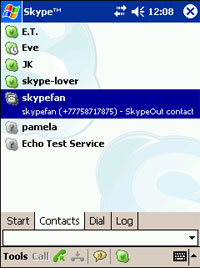 Using Skype to place voice calls to Skype users or via SkypeOut was simplicity itself, with almost all attempts to connect calls successful first time. Sadly, once connected, things weren’t quite so rosy.
Using Skype to place voice calls to Skype users or via SkypeOut was simplicity itself, with almost all attempts to connect calls successful first time. Sadly, once connected, things weren’t quite so rosy.
My first call was encouraging; with the other person’s voice coming over reasonably clear with no problems their end either.
The second call, however, was a catastrophe, with a distorted, intermittent signal making me sound like Norman Collier doing an impression of the Daleks. It was unusable.
Other calls have resulted in recipients being subjected to buzzes, clicks, pops, complete silences or weird dub remixes of my voice, while I’ve been treated to random snippets of audio, whirring clicks and, in once case, words spoken some time previously coming back in a spooky loop.
At times, it was a bit like trying to communicate over a children’s walkie-talkie at the limits of its range or hearing disconnected voices through the fug of mind bending drugs.
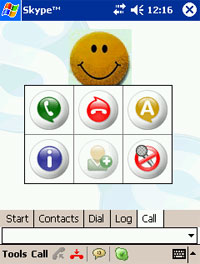 But I battled on, and found subsequent Skype calls to be a veritable potpourri of good, bad and indifferent, with more terrible calls than good ones.
But I battled on, and found subsequent Skype calls to be a veritable potpourri of good, bad and indifferent, with more terrible calls than good ones.
In didn’t help that Skype defaulted to using the JAM’s speakerphone, making a headset essential for any kind of clarity (and privacy).
Although you can buy natty headsets with boom microphones that make you look like an Air Traffic Controller, I’ve yet to see a Pocket PC with a dedicated mic input, so you’ll still have to bark your words into the device’s integrated microphone.
For the greater part, the IM element of Skype worked fine, and if you’ve got a wide circle of chums using Skype, is worth the download alone.
Conclusion
With the fast growth of VoiP and Wi-Fi access, there’s no denying that the software has huge potential.
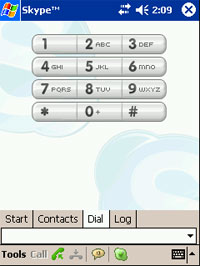 As we reported in March 2005, there’s free Skype access provided at hundreds of airports, railways stations etc through The Cloud’s network, which – in theory – means you could be ringing up associates worldwide for nowt.
As we reported in March 2005, there’s free Skype access provided at hundreds of airports, railways stations etc through The Cloud’s network, which – in theory – means you could be ringing up associates worldwide for nowt.
But no business client is going to be impressed with a phone call full of buzzing noises, weird clicks with the caller sounding like Sparky the Magic Piano on a bad day.
Seeing as almost all of the problems encountered were specific to the PocketPC version, it’s hard to work out whether it’s the limitations of the platform holding back Skype, or that the software hasn’t matured yet.
The good news is that Skype for Pocket PC is a free download, so it’s definitely checking it out to see how it works on your device.
The company are aggressively developing the product, and with luck many of the issues we encountered may be resolved in the near future.
For now, we can only give it a mixed review. We love the technology and we – naturally – love the idea of free VoiP calls on a smartphone, but until calls become more reliable – and usable – we’ll be sticking to conventional networks for important calls.
Rating: 3/5 ![]()
![]()
 Yahoo has whipped out its wallet and snapped up DialPad Communications, a company making VoIP software allowing users to make cut-price calls over the Internet.
Yahoo has whipped out its wallet and snapped up DialPad Communications, a company making VoIP software allowing users to make cut-price calls over the Internet. The company offers a selection of VoIP subscription plans to users – including prepaid VoIP calling cards – with charges ranging from as little as 1.7 cents per minute for calls to more than 200 countries.
The company offers a selection of VoIP subscription plans to users – including prepaid VoIP calling cards – with charges ranging from as little as 1.7 cents per minute for calls to more than 200 countries.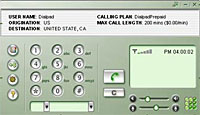 In its announcement, Dialpad served up a bit more information about the deal: “Yahoo plans on leveraging Dialpad’s PSTN calling capabilities to add to Yahoo Messenger’s recently enhanced PC-to-PC voice calling offering. These products are very complementary and by combining our strengths, we are better positioned to take advantage of the fast growing IP telephony market and build a range of exciting new services.”
In its announcement, Dialpad served up a bit more information about the deal: “Yahoo plans on leveraging Dialpad’s PSTN calling capabilities to add to Yahoo Messenger’s recently enhanced PC-to-PC voice calling offering. These products are very complementary and by combining our strengths, we are better positioned to take advantage of the fast growing IP telephony market and build a range of exciting new services.” BT has unveiled a smarty-pants phone designed to integrate landline and mobile phone technologies.
BT has unveiled a smarty-pants phone designed to integrate landline and mobile phone technologies. BT Fusion is part of the company’s strategy to lure back customers wooed by mobile telephonic temptresses touting cheap calls.
BT Fusion is part of the company’s strategy to lure back customers wooed by mobile telephonic temptresses touting cheap calls. “The future will be convergence”, insisted Livingstone. “This is going to be a market that grows fantastically over time even though it might take a while to get going. We still expect many millions of converged handsets by the end of the decade.”
“The future will be convergence”, insisted Livingstone. “This is going to be a market that grows fantastically over time even though it might take a while to get going. We still expect many millions of converged handsets by the end of the decade.” Calls to landlines originating in the home will be ratcheted up at BT’s regular rate of 5.5 p (10 cents, €0.08) for up to an hour.
Calls to landlines originating in the home will be ratcheted up at BT’s regular rate of 5.5 p (10 cents, €0.08) for up to an hour. After several weeks in beta, Skype has officially launched the Skype Voicemail service, the company’s second pre-paid premium offering.
After several weeks in beta, Skype has officially launched the Skype Voicemail service, the company’s second pre-paid premium offering. Skype v1.3 allows bolts on the ability to populate Skype contact lists from desktop applications including MSN, and auto-populate exact matches from Microsoft Outlook.
Skype v1.3 allows bolts on the ability to populate Skype contact lists from desktop applications including MSN, and auto-populate exact matches from Microsoft Outlook. United and Verizon Airfone have become the first companies to receive Federal Aviation Administration (FAA) approval to install Wi-Fi for use on US domestic commercial aircraft.
United and Verizon Airfone have become the first companies to receive Federal Aviation Administration (FAA) approval to install Wi-Fi for use on US domestic commercial aircraft. Although the FAA approval currently only applies to the cabin of United’s B757-200 aircraft, it’s an important landmark on the way to enabling full high-speed wireless Internet access on board all United aircraft.
Although the FAA approval currently only applies to the cabin of United’s B757-200 aircraft, it’s an important landmark on the way to enabling full high-speed wireless Internet access on board all United aircraft. Once a service provider is selected by the FCC, United should be able to meet their passengers’ Wi-Fi needs in double quick time with, no doubt, zillions of other airlines following their lead.
Once a service provider is selected by the FCC, United should be able to meet their passengers’ Wi-Fi needs in double quick time with, no doubt, zillions of other airlines following their lead. Skype users can now gaze at each other’s ugly mugs (and other body parts) while they waffle online, thanks to a new free plug in from Dialcom.
Skype users can now gaze at each other’s ugly mugs (and other body parts) while they waffle online, thanks to a new free plug in from Dialcom. The deal for Webmasters is that Skype will dish out commissions of up to 10 per cent of its own store purchase revenues when a buyer is referred from their site.
The deal for Webmasters is that Skype will dish out commissions of up to 10 per cent of its own store purchase revenues when a buyer is referred from their site. Here at VON Europe in Stockholm, Sweden, Niklas Zennstrom, CEO of Skype, has just announced the official launch of the Skype affiliate scheme. The scheme has been running as a trial for a few weeks, gaining 1,800 members.
Here at VON Europe in Stockholm, Sweden, Niklas Zennstrom, CEO of Skype, has just announced the official launch of the Skype affiliate scheme. The scheme has been running as a trial for a few weeks, gaining 1,800 members.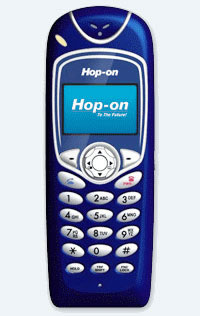 They’ve got a bit of a reputation for being a tad over-affirmative with their announcements, but Californian wireless solutions company Hop-on have revealed details of their new US$39 (~€31~£21.33) WiFi phone.
They’ve got a bit of a reputation for being a tad over-affirmative with their announcements, but Californian wireless solutions company Hop-on have revealed details of their new US$39 (~€31~£21.33) WiFi phone. Of course, the main attraction of this phone is the low, low price, with the company claiming that it “provides all the features and functionality of a VoIP terminal adapter but has the advantage of enabling users to talk from any available public or private WiFi access point. ”
Of course, the main attraction of this phone is the low, low price, with the company claiming that it “provides all the features and functionality of a VoIP terminal adapter but has the advantage of enabling users to talk from any available public or private WiFi access point. ” It’s an ugly looking beast all right, but we like the idea of cheap VoIP handsets, although hardened old cynics like us would suggest that you don’t hold your breath on this one, quite yet.
It’s an ugly looking beast all right, but we like the idea of cheap VoIP handsets, although hardened old cynics like us would suggest that you don’t hold your breath on this one, quite yet. The clever-clogs at Toshiba Research Europe have announced that they have been successful in applying quantum cryptography to the transmission of video and voice over IP.
The clever-clogs at Toshiba Research Europe have announced that they have been successful in applying quantum cryptography to the transmission of video and voice over IP. Toshiba’s quantum video link increases the security of communication systems by encrypting every single video frame with a unique digital key – so cracking one frame of a video would be useless unless all the other frames were cracked too.
Toshiba’s quantum video link increases the security of communication systems by encrypting every single video frame with a unique digital key – so cracking one frame of a video would be useless unless all the other frames were cracked too. “Imagine if you received a letter, you opened that letter and read it, there is no way of telling if someone has read that letter en route. When you encode the information on single particles, the letter self destructs whenever someone else reads it.”
“Imagine if you received a letter, you opened that letter and read it, there is no way of telling if someone has read that letter en route. When you encode the information on single particles, the letter self destructs whenever someone else reads it.”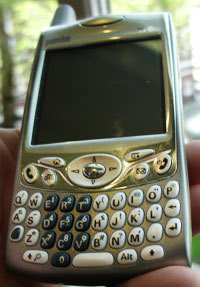 PalmOne has formally launched its Treo 650 in the UK – more than six months after jammy Americans got their mitts on the keenly anticipated smartphone.
PalmOne has formally launched its Treo 650 in the UK – more than six months after jammy Americans got their mitts on the keenly anticipated smartphone. The handset includes useful quad-band GSM/GPRS connectivity for voice and data, with the bundled VersaMail email application supporting a single Microsoft Exchange Server 2003 ActiveSync account and multiple IMAP and POP accounts.
The handset includes useful quad-band GSM/GPRS connectivity for voice and data, with the bundled VersaMail email application supporting a single Microsoft Exchange Server 2003 ActiveSync account and multiple IMAP and POP accounts. Even with WiFi, Treo users will still be missing out on the killer VoIP application, Skype, so I asked if there were any plans to introduce a version for the Palm platform.
Even with WiFi, Treo users will still be missing out on the killer VoIP application, Skype, so I asked if there were any plans to introduce a version for the Palm platform. Despite attending an official product launch, I left none the wiser as to when the Treo will actually be available or what other network carriers (apart from Orange) will be offering the phone. Naturally, there wasn’t a peep about pricing plans either.
Despite attending an official product launch, I left none the wiser as to when the Treo will actually be available or what other network carriers (apart from Orange) will be offering the phone. Naturally, there wasn’t a peep about pricing plans either.